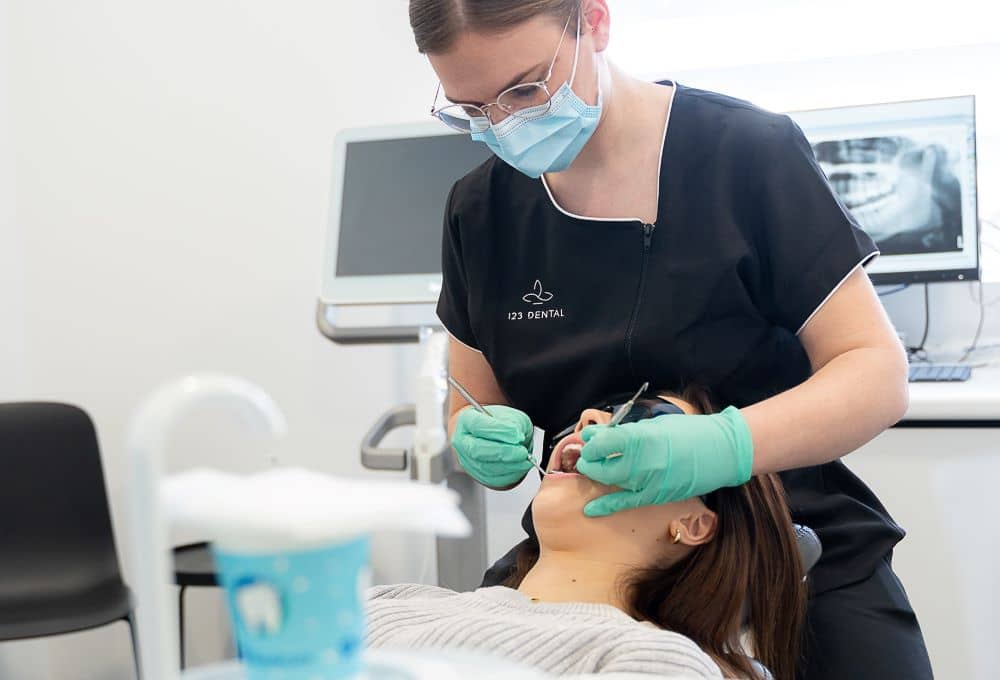Toothaches are a common oral health concern in Australia. Causes of toothaches include tooth decay, impacted wisdom teeth, infection, and gum disease.
In this article, I’ll cover 8 common causes of toothaches, how to reduce your risk of toothaches, and when to see your dentist for a toothache.
The Most Common Causes of Toothaches
Key Summary:
Toothaches can have a variety of causes, such as cavities, teeth grinding, or infection. If a toothache lasts more than two days or is unbearably painful, contact our caring team at 123 Dental right away to schedule an evaluation.
-
Cavities and Tooth Decay
Cavities and tooth decay are the most common causes of toothaches. When deep decay sets in, it can irritate the nerve of the tooth and cause severe pain. Since good oral hygiene can help prevent decay, it is imperative to brush and floss daily.
At first, decay and cavities may go unnoticed, which is one of the biggest reasons I stress the importance of regular dental checkups. These general checkups allow dentists to detect decay as early as possible and treat it before it gets worse or leads to an infection.
I go into more of the benefits of general checkups in this post: Dental Checkups: 5 Benefits for Regular Checkups.
-
Gum Disease
Gum disease is another cause of toothaches. Its early stage, gingivitis, involves sensitive gums that often bleed during brushing. Left untreated, gingivitis can advance into periodontitis. This can cause the gums to recede, exposing tooth roots and leading to tooth pain, sensitivity, and possible tooth loss.
I always encourage my patients to follow a good oral hygiene routine and attend regular dental checkups. This is the best approach to preventing gum disease and catching and treating it early if it does occur.
-
Injury or Trauma to the Mouth or Teeth
Trauma or injury to the mouth or teeth can lead to toothaches and broken or knocked out teeth.
If you have a toothache from getting hit in the mouth or getting a tooth knocked out, contact your dentist immediately. Even if you aren’t experiencing a toothache, you should still schedule an appointment with your dentist to have your teeth evaluated after cracking, chipping, losing a tooth, or getting hit in the mouth.
You May Also Like: Can Sinus Pressure Cause Tooth Pain?
-
Wisdom Teeth
Wisdom teeth are another common cause of tooth pain. When wisdom teeth erupt, they often lack adequate space to come through at the proper angle.
This crowding can cause a condition known as wisdom tooth impaction. One of the common symptoms of wisdom tooth impaction is a toothache near the far back of the mouth. For wisdom toothache relief, contact your dentist right away. Your dentist can evaluate your wisdom teeth and use X-rays to determine the appropriate treatment.
Often, wisdom toothache relief requires wisdom tooth extraction. Left untreated, impacted wisdom teeth can lead to serious oral health issues, such as tumours, bone loss, and cysts.
Learn More: Do I Have Wisdom Teeth? What Problems Will They Cause?
-
Damaged Dental Restoration
Damaged dental restorations, such as fillings or dental crowns, are another common cause of toothaches. Dental crowns are an effective way to restore worn down, misshapen, discoloured, or broken teeth. However, damage to this dental restoration can cause a crown toothache.
-
Abnormal Bite
When upper and lower teeth do not fit together properly, it is known as malocclusion. Misalignment from an abnormal bite can cause pain, discomfort, and difficulty when chewing or biting.
A misaligned bite can be the result of:
- Dental appliances that do not fit properly
- Impacted teeth
- Tooth loss that allows surrounding teeth to shift out of alignment
- Thumb-sucking
- Genetics
- Excessive pacifier use
-
Abscessed Tooth
An abscessed tooth is a bacterial infection in the gums or within a tooth. This can happen when a cavity reaches the pulp chamber of the tooth or due to trauma to the tooth.
An abscessed tooth can result in a severe toothache that requires evaluation by your dentist. Make an appointment if you experience these signs of an abscessed tooth:
- Swollen gums
- Severe pulsating toothache pain
- An infected root
- Possible bone loss at the infection site
-
Teeth Grinding/Bruxism
Teeth grinding can also cause toothaches. Grinding or clenching teeth stresses the jaw muscles and the temporomandibular joint (TMJ).
Learn More: Teeth Grinding – What is Bruxism & How can it be treated?
Best Ways to Self-Care for Toothaches
Toothache home remedies can offer mild relief but it is important to contact your dentist if the pain persists. A toothache can indicate a serious underlying issue that requires immediate medical attention.
If you have mild toothache pain, here are a few toothache home remedies to try as you wait to see a dentist:
- Ice Packs: Ice packs are one of the safest, most effective ways to reduce toothache pain naturally. Ice can reduce inflammation, shrink blood vessels, and ease pain. To use ice for a toothache, hold an ice pack on the affected area for 20 minutes. Always use a clean cloth to prevent the ice from directly contacting your skin. Repeat several times a day.
- Saltwater Rinse: Rinsing with warm saltwater can help naturally reduce inflammation and help disinfect the affected area. To use a saltwater rinse for toothache relief, mix 8 ounces of warm water with 1/2 teaspoon of salt. Swish the saltwater rinse for 30 seconds, spit it out, and rinse thoroughly with plain water.
- Toothache Drops: Toothache drops can be purchased over-the-counter for temporary relief of mild tooth pain. Toothache drops contain numbing ingredients such as benzocaine that can be applied topically.
- Try a Hydrogen Peroxide Rinse: I prefer ice packs and saltwater rinses compared to hydrogen peroxide rinses but some of my patients have reported relief using it. Diluted hydrogen peroxide can help ease toothache pain and reduce inflammation.
Make sure to never rinse with pure hydrogen peroxide. Use equal parts water mixed with hydrogen peroxide, swish it around for 30 seconds, spit it out, and rinse thoroughly with water.
- Practice Toothache Prevention: I recommend following a good oral hygiene routine to help reduce your risk of experiencing a toothache. Floss daily, brush twice a day with a soft-bristled toothbrush and fluoride toothpaste, limit your intake of sugary and acidic foods, drink enough water, and attend regular dental checkups.
- OTC Pain Relievers: Over-the-counter pain relievers can help ease a toothache as you wait to see your dentist.
When Is a Toothache a Dental Emergency?
In some cases, a toothache is considered a dental emergency. A severe toothache may indicate an infection that can spread to other areas of the body.
If you are experiencing these symptoms with your toothache, contact your dentist immediately:
- Fever
- Chills
- Unbearable, severe toothache
- Facial or jaw swelling
- Uncontrolled bleeding
If you are having trouble breathing or swallowing, see a doctor immediately. Learn more about dental emergencies and how to recognise them in our guide here: What Is a Dental Emergency and When to See Your Dentist?
Dental Help for Toothaches
Dentists have several effective ways to treat toothaches. The treatment will depend on the underlying cause of your toothache.
Here are some common dental treatments for toothaches:
- Dental Fillings: Dental fillings can be used to treat small cavities or minor tooth damage. During a filling, the damaged portion of the tooth is removed to restore the tooth. This can treat the toothache and fortify the affected tooth against future issues.
- Tooth Extraction: Damaged or misaligned teeth may require extraction to stop a toothache. Impacted wisdom teeth often require extraction as well.
- Dental Crowns: Larger cavities or serious tooth damage may require a dental crown to restore the tooth.
- Dental Surgery: Dental surgery can fix an abnormal bite causing tooth pain.
- Dental Appliances: Dental appliances, such as bite splints, can address misaligned teeth, bruxism, and other causes of toothaches.
- Root Canal Therapy: If tooth pulp (the inside of the tooth) is invaded by bacteria, root canal treatment may be necessary. Root canal therapy removes infected tissue, cleans the tooth, fills the area, and gets sealed with a crown to restore the tooth and relieve pain.
- Antibiotics: You may be prescribed antibiotics are part of the treatment for an infected tooth.
Toothache, Pulsing Pain, or Concerns? Our Caring Team At 123 Dental Can Get You Relief Fast
Toothaches can have many causes but large cavities are one of the most common reasons. Advanced gum disease is another common cause of toothaches. The good news is that you can reduce your risk of toothaches by practicing a good oral hygiene routine and attending regular dental checkups.
Toothaches lasting more than two days can indicate serious oral health concerns and should not be ignored. Fortunately, there is a wide range of effective dental treatments for toothaches.
If you are dealing with a toothache, I know how easily the pain can disrupt daily life. Our dentists at 123 Dental can determine the underlying cause of your toothache and get you relief as quickly as possible.
If you are in the West Leederville, West Perth, Leederville, Subiaco, Jolimont, Wembley, or Perth area, contact us to book your appointment and find toothache relief.






